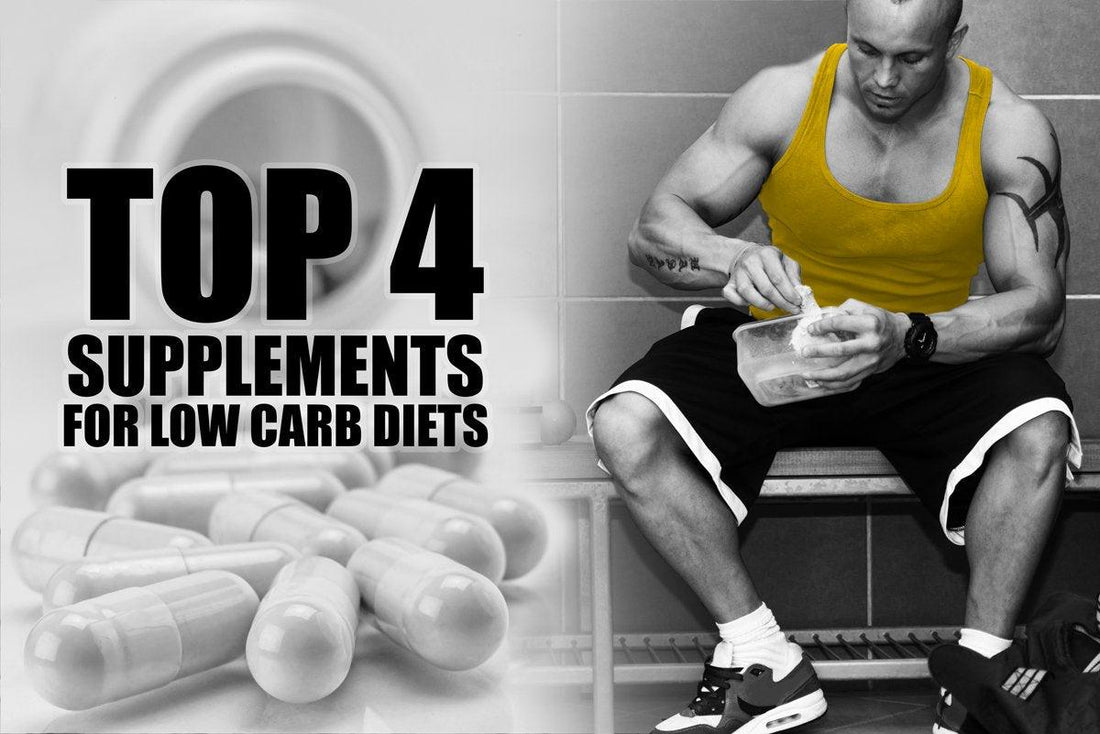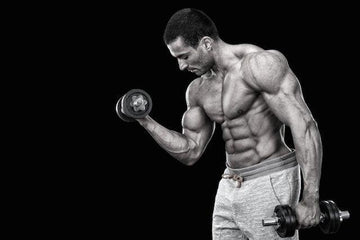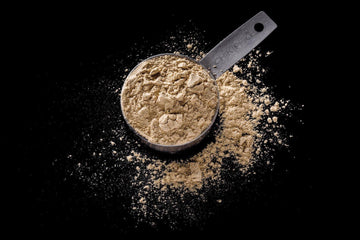

Top 4 Supplements for Low Carb Diets
Table of Contents
On a Low Carb Diet? You Need These 4 Essential Supplements
by: Robbie Durand
Low Carb Diet Stack Essentials from Infinite Labs
–Multivitamin (for adequate vitamins and minerals)
–HMB (reduce lean muscle mass)
–CycloREM (Improved Sleep)
–Final Cutz (Stimulate Fat Metabolism)
Low Carb Diet -Reduce Bodyfat Without Losing Lean Muscle Mass
The Low carb diet has long been used in the bodybuilding field for years to drop body fat while increasing muscle mass. Previously, low carb diets were bad-mouthed for being bad for performance and loss of lean muscle mass. Current research has proven otherwise, in fact, the studies suggest a high protein, low carb diet can maintain lean muscle mass while dieting without any negative effects on muscle strength. For example, one study examined nine elite male gymnasts from Italy were recruited and placed on a very low carbohydrate ketogenic diet. The athletes in the study average training volume was 30 hours/week. The diet provided was 54.8% fat, 40.7% protein and 4.5% carbohydrate with all vitamins and minerals accounted for to ensure proper nutrition. At the end of the study, the ketogenic diet showed a significant reduction in body weight, fat mass, and an increase in lean body mass percentage. This indicates that many athletes can perform at their normal levels of exercise while losing fat through macronutrient manipulation.
The key point that the author made in the review paper is a ketogenic diet might be used to achieve fat loss without affecting strength/power performance negatively.
In addition to strength, the ketogenic diet can also have several health benefits beyond changes in body composition.
Supplements Recommended
Multivitamin: Since certain carbohydrate-rich foods that contain important vitamins are consumed infrequently or eliminated on a low-carbohydrate diet, there is even a greater need to include a multi-vitamin supplement. Extra-strong dosages of Vitamin B and Vitamin C help to reduce tiredness. Magnesium and Potassium help reduce muscle cramps. No matter what diet you are following, it is prudent to include a multi-vitamin supplement.
 High Intensity Training and Caffeine Usage Can Disrupt Sleep
High Intensity Training and Caffeine Usage Can Disrupt Sleep
It is not uncommon the combination of caffeine use and high intense training to disrupt sleep. It is well-documented that sleep has an impact on the next day’s physical performance. A professional athlete life is challenging with high levels of mental stress and intense physical demands, and therefore, the amount of rest and recovery should also meet these elevated needs. In athletes, a poor night’s sleep may impair performance, increase the risk of exercise-related injuries, impaired recovery, increased feelings of pain that them- selves predispose to sleep disturbances and delaying recovery from a sports-related injury.
The recovery provided by restorative sleep may be considered necessary for successful training and performance for athletes. The latest study reported in the JOURNAL OF SPORTS SCIENCES reported that most athletes, although mostly found to be minor, had a sleep-related disorder. The study found that one in every four athletes was found to have an actual sleep disorder. Furthermore, every sixth athlete was using sleep medication regularly during the competitive season. The prevalence of insomnia doubled as the players moved from the training season to the competitive time of the year. This study documents that athletes may need sleep supplements to support their intense training.
Low Carb Diets Can Disrupt Sleep
Sleep is considered to be the “gold standard” post-exercise recovery procedure amongst athletes. During sleep, muscles are regenerated and during sleep, there is an increase in growth hormone that has significant effects on protein synthesis and repair. If you have ever seen a bodybuilder on an extreme diet getting ready for a show, you will notice that he is sleeping more often. Sleep is an essential aspect of recovery and fatigue management. Disturbed sleep is often reported as both a contributor and symptom of increased physical strain on the body.
One study investigated the effects of a very low carb diet on sleep in men, the low carb diet consisted of 38% of energy from protein, 61% from fat, <1% from carbohydrate). Each participant was maintained on 2400 kcal/d for the 5-day low carb diet period. The researchers found that REM sleep was reduced during ketosis phases relative to the control phase. The arousal index was significantly increased during sleep stages 1 and 2 after the very low carb acute and ketosis phases compared with after the control phase. The higher the arousal index, the more tired you are likely to feel, though people vary in their tolerance of sleep disruptions.
Supplements Recommended
 CYCLOREM is great for increasing REM sleep and improve sleep quality. CYCLOREM can counteract some of the negative effects of high caffeine and high intensity training and support restful sleep.
CYCLOREM is great for increasing REM sleep and improve sleep quality. CYCLOREM can counteract some of the negative effects of high caffeine and high intensity training and support restful sleep.
Low-Calorie Diets Can Reduce Metabolism
It is not uncommon for bodybuilders to lose muscle and they are getting ready for a competition. The general endocrine response to a low-calorie diet is increased hunger, reduced metabolic rate, and loss of lean muscle mass. No matter how much protein a bodybuilder consumes, it’s nearly impossible to keep all the muscle while dieting to get ripped up. Severe calorie restricted diet is often associated with a reduced thermogenic response. It makes sense that the body sense a reduction in calories will send a negative feedback loop to your brain to slow down metabolic rate to compensate for the loss of calories. The decrease in thermogenic response is due to some hormones such as thyroid, insulin, testosterone, and leptin. The hormones of the thyroid gland, particularly triiodothyronine (T3), are known to play an important and direct role in regulating metabolic rate. Increases in circulating thyroid hormones are associated with an increase in the metabolic rate, whereas lowered thyroid levels result in decreased thermogenesis and overall metabolic rate. Some studies have reported that caloric restriction results in a reduction in thyroid function.
Green Tea Extract, Caffeine, and Synephrine and High-Intensity Exercise: Ultimate Thermogenic Stack
Thermogenesis is the process of heat production in living organisms that can facilitate the fat burning process. There are many ingredients in most over the counter fat burners. Of these bioactive compounds, caffeine, synephrine and green tea catechins of various plant extracts remain arguably as the main ingredients found in thermogenic supplements today. In the prestigious Journal of Strength and Conditioning Research reported in the study titled, “Dietary Caffeine And Polyphenol Supplementation Enhances Overall Metabolic Rate And Lipid Oxidation At Rest And After A Bout Of Sprint Interval Exercise” reported that caffeine and green tea extract increased post-exercise fat oxidation after sprint exercise by 10%. When green tea extract and caffeine are combined, they operate synergistically to enhance metabolism, fat oxidation, and ultimately facilitate weight loss. Previous research has found that a combined treatment of a catechin polyphenol-caffeine mixture has shown to induce a significantly greater thermogenic response than an equivalent amount of caffeine. At the end of the study, during the resting state, a single dosing of green tea extract and caffeine induced an approximate 8% rise in energy expenditure with an increase in oxygen uptake. Accompanying this thermogenic response was a 10% increase in fat oxidation rate. Specifically, post-sprint exercise energy expenditure was approximately 10% greater with pre-exercise caffeine-polyphenol supplementation versus placebo. The results suggest that increased lipid oxidation rate following sprint interval exercise is further amplified with a single caffeine-polyphenol dosing. This is a great study showing the synergistic effect of combining caffeine and green tea extract with high intensity exercise can enhance fat oxidation.
Supplements Recommended
Final Cutz contains a scientifically balanced blend of caffeine, green tea, synephrine, and other ingredients to stimulate metabolism. HMB should also be taken while on a low carb diet to reduce muscle tissue breakdown that often occurs with low-calorie diets.
Killer SC, Svendsen IS, Jeukendrup AE, Gleeson M. Evidence of disturbed sleep and mood state in well-trained athletes during short-term intensified training with and without a high carbohydrate nutritional intervention. J Sports Sci. 2015 Sep 25:1-9.
Myllymaki, T., Kyrolainen, H., Savolainen, K., Hokka, L., Jakonen, R., Juuti, T., & Rusko, H. (2011). Effects of vigorous late-night exercise on sleep quality and cardiac autonomic activity. Journal of Sleep Research, 20 (1 Pt 2), 146–153.
Davenne, D. (2009). Sleep of athletes–problems and possible solutions. Biological Rhythm Research, 40 (1), 45–52.
Jeukendrup, A. (2014). A step towards personalized sports nutrition: Carbohydrate intake during exercise. Sports Medicine (Auckland, N.Z.), 44(SupplS1), 25–33.
Chennaoui, M., Arnal, P. J., Sauvet, F., & Léger, D. (2015). Sleep and exercise: A reciprocal issue? Sleep Medicine Reviews, 20, 59–72.
Fullagar, H. H., Skorski, S., Duffield, R., Hammes, D., Coutts, A. J., & Meyer, T. (2015). Sleep and athletic performance: The effects of sleep loss on exercise performance, and physiological and cognitive responses to exercise. Sports Medicine (Auckland, N.Z.), 45(2), 161–186.
Halson, S. L. (2014). Sleep in elite athletes and nutritional interventions to enhance sleep. Sports Medicine (Auckland, N.Z.), 44(Suppl 1), S13–23.
Juliff, L. E., Halson, S. L., & Peiffer, J. J. (2015). Understanding sleep disturbance in athletes prior to important competitions. Journal of Science and Medicine in Sport /Sports Medicine Australia, 18(1), 13–18.
Nédélec, M., Halson, S., Delecroix, B., Abaidia, A., Ahmaidi, S., & Dupont, G. (2015). Sleep hygiene and recovery strategies in elite soccer players. Sports Medicine, 45(11), 1547–1559.
Thun, E., Bjorvatn, B., Flo, E., Harris, A., & Pallesen, S. (2015). Sleep, circadian rhythms, and athletic performance. Sleep Medicine Reviews, 23, 1–9.
o et al. “Dietary Caffeine And Polyphenol Supplementation Enhances Overall Metabolic Rate And Lipid Oxidation At Rest And After A Bout Of Sprint Interval Exercise.” Journal of Strength & Conditioning Research: Post Acceptance: November 23, 2015.
Dulloo AG, Duret C, Rohrer D et al. Efficacy of a green tea extract rich in catechin polyphenols and caffeine in increasing 24-h energy expenditure and fat oxidation in humans. Am J Clin Nutr. 1999;70(6):1040-5.
Gahreman D, Wang R, Boutcher Y, Boutcher S. Green Tea, Intermittent Sprinting Exercise, and Fat Oxidation. Nutrients. 2015 Jul 13;7(7):5646-5663.
Tsai AG, Williamson DF, Glick HA. Direct medical cost of overweight and obesity in the USA: a quantitative systematic review. Obesity reviews : an official journal of the International Association for the Study of Obesity. 2011;12:50–61.
Goran MI, Alderete TL. Targeting adipose tissue inflammation to treat the underlying basis of the metabolic complications of obesity. Nestle Nutrition Institute workshop series. 2012;73:49–60. discussion p1-6.
Kalupahana NS, Claycombe KJ, Moustaid-Moussa N. (n-3) Fatty acids alleviate adipose tissue inflammation and insulin resistance: mechanistic insights. Advances in nutrition. 2011;2:304–316.
Basu A, Lucas EA. Mechanisms and effects of green tea on cardiovascular health. Nutrition reviews. 2007;65:361–375.
Chen Z, Zhu QY, Tsang D, Huang Y. Degradation of green tea catechins in tea drinks. Journal of agricultural and food chemistry. 2001;49:477–482.
Chan CY, Wei L, Castro-Munozledo F, Koo WL. (−)-Epigallocatechin-3-gallate blocks 3T3-L1 adipose conversion by inhibition of cell proliferation and suppression of adipose phenotype expression. Life sciences. 2011;89:779–785.
Hung PF, Wu BT, Chen HC, Chen YH, Chen CL, Wu MH, et al. Antimitogenic effect of green tea (−)-epigallocatechin gallate on 3T3-L1 preadipocytes depends on the ERK and Cdk2 pathways. American journal of physiology Cell physiology. 2005;288:C1094–C1108.

















